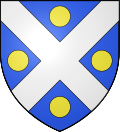
Jean Antoine Letronne was a French archaeologist.

Marie de Gournay was a French writer, who wrote a novel and a number of other literary compositions, including The Equality of Men and Women and The Ladies' Grievance. She insisted that women should be educated. Gournay was also an editor and commentator of Michel de Montaigne. After Montaigne's death, Gournay edited and published his Essays.
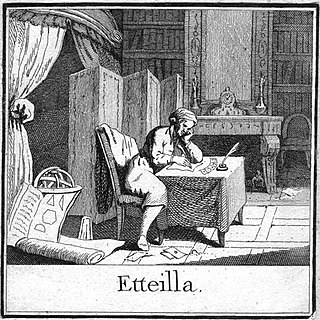
"Etteilla", the pseudonym of Jean-Baptiste Alliette, was the French occultist and tarot-researcher, who was the first to develop an interpretation concept for the tarot cards and made a significant contribution to the esoteric development of the tarot cards to a wide audience, and therefore the first professional tarot occultist known to history who made his living by card divination. Etteilla also influenced the French divination professional Marie Anne Lenormand. In the years 1783–1785 Etteilla published his work Manière de se récréer avec le jeu de cartes nommées tarots, which is still considered the standard reference work of Tarot cartomancy. Etteilla published his ideas of the correspondences between the tarot, astrology, and the four classical elements and four humors, and in 1789 he published his own tarot deck, which, however, differed significantly from the classic tarots such as the Tarot de Marseille in terms of structure and card designations.
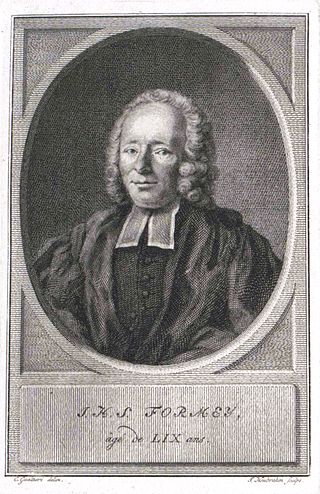
Johann Heinrich Samuel Formey was a German churchman, educator, author, and journalist. The son of an immigrant French family, he preached, taught, and wrote in French. A founding member of the Berlin Academy, he wrote thousands of letters, popularized scientific and philosophical ideas, and also contributed to Diderot's Encyclopédie.
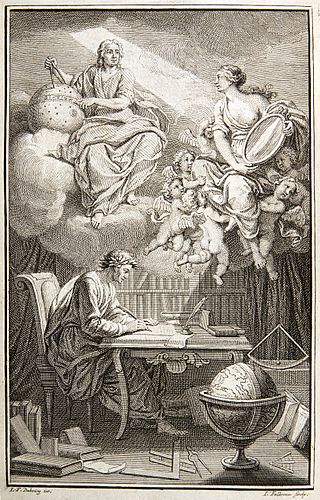
The Lumières was a cultural, philosophical, literary and intellectual movement beginning in the second half of the 17th century, originating in western Europe and spreading throughout the rest of Europe. It included philosophers such as Baruch Spinoza, David Hume, John Locke, Edward Gibbon, Voltaire, Jean-Jacques Rousseau, Denis Diderot, Pierre Bayle and Isaac Newton. This movement is influenced by the scientific revolution in southern Europe arising directly from the Italian Renaissance with people like Galileo Galilei. Over time it came to mean the Siècle des Lumières, in English the Age of Enlightenment.
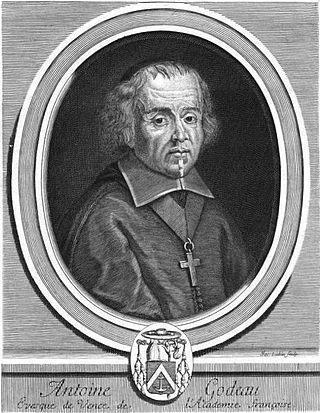
Antoine Godeau was a French bishop, Baroque Précieuses poet and exegete. He is now known for his work of criticism Discours de la poésie chrétienne from 1633.

Claude-Adrien Nonnotte was a French Jesuit controversialist, best known for his writings against Voltaire.
Michel, chevalier de Cubières was an 18th-century French writer, known under the pen-names of Palmézaux and Dorat-Cubières, taking the latter name as he had Claude Joseph Dorat as his master.

Michel de Marolles, known as the abbé de Marolles, was a French churchman and translator, known for his collection of old master prints. He became a monk in 1610 and later was Abbot of Villeloin (1626–1674). He was the author of many translations of Latin poets and was part of many salons, notably that of Madeleine de Scudéry. He is best known for having collected 123,000 prints - this acquisition is considered the foundation of the cabinet of prints in the royal library, though it was only constituted as a department in 1720.
Michel Droit was a French novelist and journalist. He was the father of the photographer Éric Droit (1954–2007).
Jean Gallois was a French scholar and abbé.

Nicolas de Malézieu was a French intellectual, Greek scholar and mathematician.
Gilles Filleau des Billettes was a scholar, member of the Académie des Sciences who corresponded with Leibniz. His personal copy of one of Leibniz's mathematical papers was rediscovered in 1956.

Antoine-François Delandine, was a French writer.

Claude-Nicolas Le Cat was a French surgeon and science communicator.
Jean Saas was an 18th-century French historian and bibliographer.
Pierre Nicolas Chantreau, called don Chantreau, was an 18th-century French historian, journalist, grammarian and lexicographer.
Louis-Joseph Lavallée marquis de Boisrobert, called Joseph Lavallée was an 18th–19th-century French polygraph and man of letters.
Jacques Montet was an 18th-century French pharmacist, chemist and encyclopediste.
François Raguenet was a French historian, biographer and musicologist.

